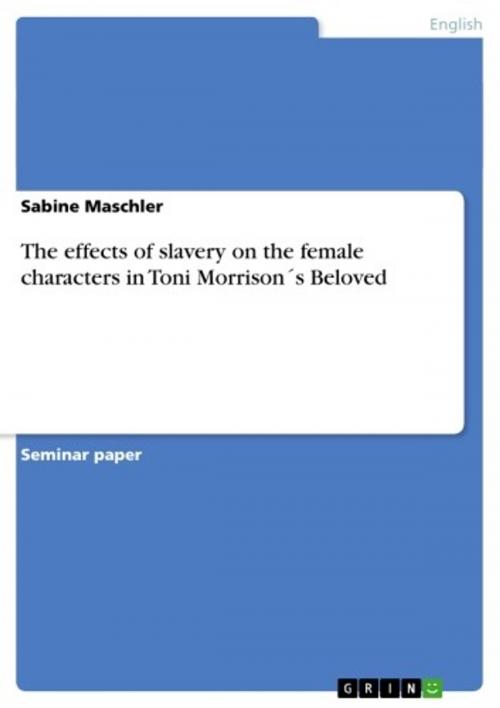The effects of slavery on the female characters in Toni Morrison´s Beloved
Nonfiction, Entertainment, Drama, Anthologies| Author: | Sabine Maschler | ISBN: | 9783638857178 |
| Publisher: | GRIN Publishing | Publication: | November 15, 2007 |
| Imprint: | GRIN Publishing | Language: | English |
| Author: | Sabine Maschler |
| ISBN: | 9783638857178 |
| Publisher: | GRIN Publishing |
| Publication: | November 15, 2007 |
| Imprint: | GRIN Publishing |
| Language: | English |
Seminar paper from the year 2003 in the subject American Studies - Literature, grade: 2,0, University of Vienna, 8 entries in the bibliography, language: English, abstract: Being white has always been considered as a privilege but also as a standard. Black people therefore are somehow seen as 'The Other' and are often discriminated against. African Americans have had to experience horrific acts of violence during and after the time of slavery. Even though slavery is over, black people still have to cope with prejudices and with the history of slavery. In Toni Morrison´s Beloved the relationship between history and memory is dramatized. She uses memory to explore and represent the various dimensions of slave life. By doing so, she seeks to make slavery accessible to readers for whom slavery is not a memory but a remote historical fact to be ignored, repressed and forgotten. This paper deals with the effects, slavery had on the female characters of Sethe and Baby Suggs. It especially concentrates on the traces slavery has left on their bodies as well as on their minds. The paper also aims at showing how the meaning of the characters names is connected to slavery.
Seminar paper from the year 2003 in the subject American Studies - Literature, grade: 2,0, University of Vienna, 8 entries in the bibliography, language: English, abstract: Being white has always been considered as a privilege but also as a standard. Black people therefore are somehow seen as 'The Other' and are often discriminated against. African Americans have had to experience horrific acts of violence during and after the time of slavery. Even though slavery is over, black people still have to cope with prejudices and with the history of slavery. In Toni Morrison´s Beloved the relationship between history and memory is dramatized. She uses memory to explore and represent the various dimensions of slave life. By doing so, she seeks to make slavery accessible to readers for whom slavery is not a memory but a remote historical fact to be ignored, repressed and forgotten. This paper deals with the effects, slavery had on the female characters of Sethe and Baby Suggs. It especially concentrates on the traces slavery has left on their bodies as well as on their minds. The paper also aims at showing how the meaning of the characters names is connected to slavery.















